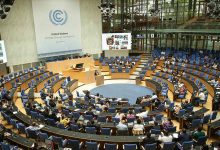Foreign minister Marise Payne has announced that Department of Foreign Affairs official Jamie Isbister has been appointed the position of Australian Ambassador for the Environment.
As the Ambassador for the Environment, Isbister will serve as Australia’s chief climate change negotiator and will take on the role in time for the next round of UN climate talks to be held in Madrid, Spain next month.
Isbister’s imminent appointment as the Ambassador for the Environment was flagged by RenewEconomy a couple of weeks ago. The position also carries responsibility for representing Australia in other international forums related to the environment, including sustainable oceans management and UNESCO World Heritage.
Prior to joining the Australian government, Isbister served in several non-governmental roles throughout the Asia Pacific and South East Asia region, including with Caritas International and in several policy positions related to refugee and displaced persons policy.
Heading into the next round of annual international climate talks, Isbister will carry responsibility for ensuring the Morrison government will retain the ability to carry over surplus Kyoto era emissions permits into the Paris Agreement, effectively allowing Australia to rely on a soft 2020 emissions reduction target to further soften its 2030 target.
Isbister replaces Patrick Suckling, who served in the environment ambassador from January 2016, through to his stepping down from the position earlier this year.
As Australia’s chief climate change negotiator, Suckling attracted criticism from climate change campaigners, for appearing on a pro-coal panel convened by representatives of the Trump Administration at the 2018 round of climate change talks in Katowice, in Poland.
Suckling recently wrote, in a relatively optimistic opinion piece, in the Guardian that he remains confident that the necessary solutions to climate change will be found and implemented, and that the sources of political division with respect to climate change are diminishing.
The appointment of Isbister as the Ambassador for the Environment was announced via a statement from foreign minister Marise Payne.
“Mr Isbister will promote Australia’s interests on international environment issues including our efforts to address climate change as part of a coordinated global effort, cooperation on sustainable oceans management and UNESCO World Heritage. Mr Isbister will also lead Australia’s engagement in the United Nations Framework Convention on Climate Change,” Payne said in the statement.
“Key priorities for Mr Isbister will be to strengthen international frameworks and cooperation on the effective global implementation of the Paris Agreement in line with our national interests and to promote Australia’s work to meet our international commitments.”
“Mr Isbister will also lead ongoing efforts to integrate climate change and sustainability into Australia’s official development assistance, including to improve climate and disaster resilience in the Pacific and to enhance climate-related private sector investment in the Pacific and Southeast Asia.”
Isbister comes to the position with a background in humanitarian diplomacy, having originally served with the government’s former overseas aid organisation AusAID before the agency was subsumed into the Department of Foreign Affairs.
Most recently, Isbister served as the first assistant secretary in the Humanitarian, Non-Government Organisations and Partnerships Division of the DFAT and previously served as the minister-counsellor within the Australian High Commission in South Africa.
As yet, there has been no formal announcement of which ministers, if any, will be in attendance at the COP25 round of international climate talks that start in two weeks.










